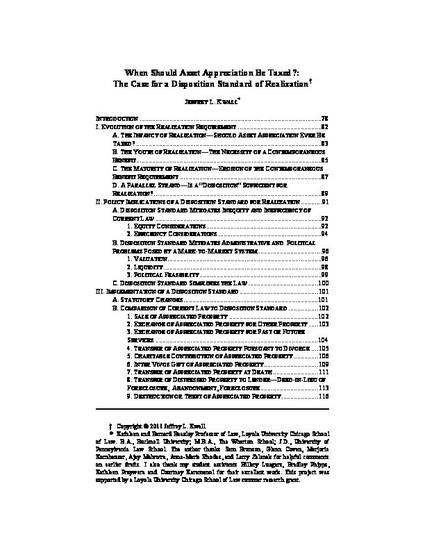
The realization requirement is one of the most basic elements of the United States income tax. Due to this requirement, any increase in the value of a person’s property is not taxed when it occurs. Rather, the tax on asset appreciation is deferred until the occurrence of a realization event; that is, until the property is transferred in exchange for money or other consideration. By contrast, all other forms of income (e.g., salary, rents) are taxed immediately.
The realization requirement is one of the most basic elements of the United States income tax. Due to this requirement, any increase in the value of a person’s property is not taxed when it occurs. Rather, the tax on asset appreciation is deferred until the occurrence of a realization event; that is, until the property is transferred in exchange for money or other consideration. By contrast, all other forms of income (e.g., salary, rents) are taxed immediately.
In light of the inequity, inefficiency, and complexity of the realization requirement, the requirement should be modified. Reformers have long argued that asset appreciation should be taxed as it occurs under a mark-to-market system. However, taxing asset appreciation as it occurs presents serious administrative problems because it requires an annual assessment of the value of every taxpayer’s assets. In addition, strong political resistance exists to taxing “paper gains.” For these reasons, it is unlikely that a comprehensive mark-to-market system will ever be adopted.
Due to the dim prospect of adopting a mark-to-market system, this Article proposes the adoption of a “disposition” standard of realization. That standard would treat every transfer of property as a realization event regardless of whether the transferor receives consideration for the transferred property. Unlike current law, the disposition standard would tax lifetime gifts, as well as testamentary transfers, of appreciated property.
A disposition standard is a second-best alternative to a mark-to-market system. This new standard would curtail the inequity and inefficiency of the current realization requirement while posing less significant administrative and political problems than a mark-to-market system. In addition, the disposition standard would simplify existing law by substituting a clear and administrable set of rules for the current ambiguous and anachronistic system. Finally, a disposition standard should help to generate much needed tax revenue.
Available at: http://works.bepress.com/jeffrey_kwall/1/
